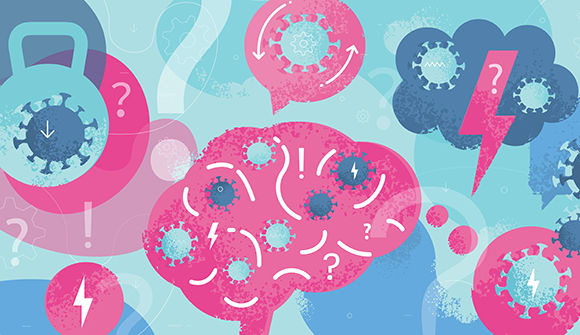A lot of nerve
Neurologists explain how COVID-19 impacts the nervous system.
Article Date:

We know COVID-19 usually causes flu-like symptoms, but did you know the virus may impact your body’s control center? For example, that telltale loss of taste and smell is not due to a stuffy nose. A recent study published in the Annals of Clinical and Translational Neurology suggests the virus not only takes a toll on your nerves, but also your nervous system.
Nerve knowledge
The study used data from 509 COVID-19 patients admitted to nine hospitals and an academic medical center in the Chicago area. Researchers found 82% of patients felt some form of neurological symptoms during their infection. Nitin Butala, MD, a neurologist with Baptist Neurology Group, said COVID-19 can cause nerve-related symptoms including:
- Loss of taste and/or smell
- Muscle pain
- Headaches
- Encephalopathy (altered mental state that can occur as a result of viral infections)
- Strokes, seizures or movement disorders (in rare cases)
Patients with COVID-19 may experience a wide variety of symptoms related to their nerves, said Neeraj Naval, MD, a hospital-based neurologist with Lyerly Neurosurgery at Baptist Health. Some symptoms are directly caused by the COVID-19 infection, but others may be related to pre-existing conditions such as epilepsy and prior strokes. In these cases, symptoms may worsen following a COVID-19 infection.
According to Dr. Naval, COVID-19 can lead to an altered mental state either directly through infection or indirectly by causing conditions that trigger it. One-quarter of COVID-19-positive individuals who are admitted to the hospital have a mental cloudiness due to strokes, seizures or fevers associated with the virus. COVID-positive patients who have a history of stroke or brain bleeds also have a much higher risk of death than those without the virus
Testing your nerves
While not all people with COVID-19 will experience the virus the same way, Dr. Naval said those with mild to moderate cases aren’t necessarily in the clear from neurological symptoms.
It’s not uncommon for the cold or flu to impact our senses of taste and smell, but COVID-19 can do so without causing a runny or stuffy nose. The virus is thought to cause inflammation near or inside the nerve cells responsible for taste or smell, meaning even people with almost no symptoms can have their nerves affected.
“While it is more likely patients with severe cases of COVID-19 will experience more significant neurological symptoms, this is not always the case,” Dr. Naval said. “Loss of taste and smell is typically seen in milder and otherwise asymptomatic cases.”
Dr. Butala explained COVID-19 is thought to affect the nervous system through a few pathways, but the exact method is still unknown. Once inside the body, the virus can potentially slip past the blood-brain barrier, a border that surrounds blood vessels in the brain and protects against dangerous germs, by attacking and attaching to white blood cells.
Post-COVID
Although most mild neurological symptoms of COVID-19 disappear after a person fights the infection, more research is needed to determine if all patients, including those who have been hospitalized, make a complete recovery.
“COVID-19 is capable of causing serious disease of the nervous system in some individuals,” Dr. Butala said. “Based on the findings in this study, hospitalized patients with encephalopathy experienced the worst outcomes and may have lasting effects such as headaches and dizziness.”
“The long-term effects of COVID-19 on the nervous system are unknown,” Dr. Butala said. “Patients will need follow-ups to determine if there are any lasting issues.”
At Baptist Health, we want to help keep our community informed about COVID-19. For more information, visit baptistjax.com/covid19.
Baptist Neurology’s highly qualified specialists are available to provide world-class care for injuries and diseases of the spine, brain and nervous system. To schedule an appointment, visit Baptist Neurology Group.



